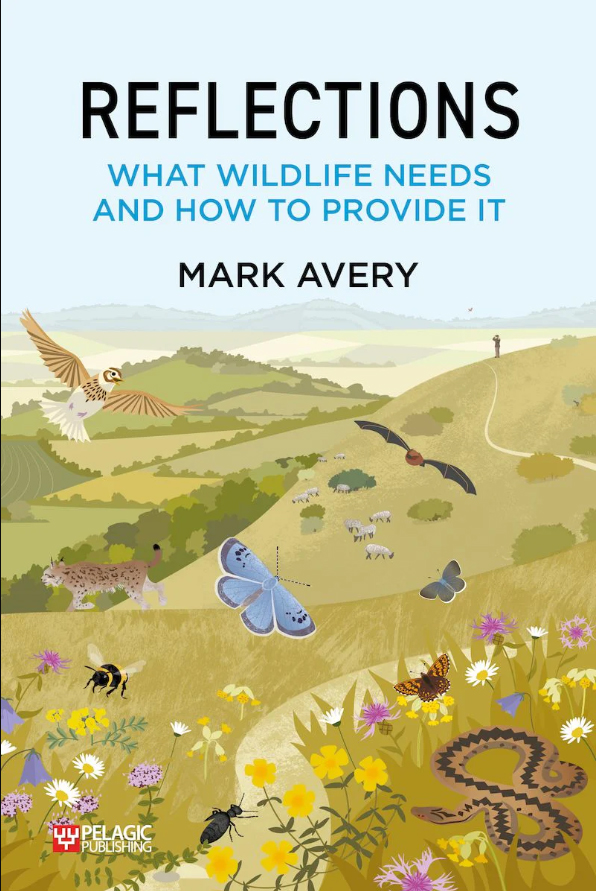Reflections: What Wildlife Needs and How to Provide it
- Reflections: What Wildlife Needs and How to Provide it by Mark Avery (Pelagic Publishing, 2023)
- 248 pages
- ISBN: 9781784273903. Pbk, £20.
- Bookshop from £18.99
Part natural history, part autobiography, part collection of thoughts and part call to arms, this book takes readers of a journey through the British landscape that touches on the past, present and future of wildlife. Written by Birdwatch columnist Mark Avery, it draws on the author's wealth of experience as a natural scientist, environmental advocate, writer and campaigner and comes with a raft of endorsements from a string of well-known figures in British wildlife protection and commentary.
Avery starts with a few pages of useful explanations, in which he sets out the style of Reflections, from his choice to favour vernacular names over Latin descriptives, emphasis on the English context and inclusion of reference notes to guide the reader on further forays into wildlife advocacy (these, incidentally, are really well designed and worth looking at). From here, the book turns to the mettle of its subject, where, across six chapters, Avery travels from the micro to the macro, taking in small details and huge dilemmas, always with a sense of passion, keen insight and playful prose. This book is engaging and explanatory, hard-hitting and yet also hopeful.
He begins in his own garden, where chapter one talks about emotional encounters with other species. These, Avery points out, are often at the root of conservationist values and so it makes sense to start a discussion about British wildlife on the doorstep. Avery takes his readers on a delightful wander outside, from his garden wall filled with Herb Robert past neighbouring houses, the local chippy and along to the local wood where Song Thrushes and pipistrelles enliven the scene (but no longer, sadly, nightingales). He talks of Red Kites, hedgehogs, domestic cats, falcons, flying ants, swifts and pheasants in a breathlessly animated almanac of daily wildlife interactions. From these personal glimpses, chapter two scans a wider scene to examine the state of wildlife in the UK. Avery speaks here of monitoring and health checks, extinctions and invasive species, tree cover, farm systems and marine habitats, and of the 'House Martin effect' – a chronic, but often under the radar, trickle of long-term species decline.
Beneath its personable style, Reflections is not afraid to pull its punches. The four horsemen of the ecological apocalypse, which Avery sets out in chapter two, are starkly identified as anthropogenic in origin and, as he rightly notes, it remains up to us as a species to either make things worse, stop, or repair the damage. Chapter three considers some of the paths trod thus far by the wildlife conservation movement, while chapter four scrutinises a long procession of success stories of ecological restitution, from rats on Ailsa Craig to Hope Farm's skylarks. There are some 18 of these snapshot stories, wonderful, invigorating and all with useful historical lessons to take heed of. It is this context of the now and the soon which occupy the last two chapters, the first of which documents the pressing challenges of the present and, the second, a reckoner of future action.
These last chapters seem worlds away from the book's first wanders around a backyard habitat and yet the route is a seamless one: from the Grey Squirrels of Raunds to the politics of land ownership, advocacy and active investorship in less than 200 pages. A pretty impressive trail. Reflections is a great book – intimate and expansive, personal and political, and packed full of insights about Britain's critterly complement. A manifesto (scarcely) hidden in a memoir, it plots a journey from encounter through hope and action. Readers might not agree with everything Avery says, but his approach is clearly and directly articulated, ably combines science and passion and – in setting out a number of ways forward – opens up space for a valuable, critical dialogue on conservation futures. Given the immense challenges facing species in a 21st-century world of biodiversity collapse and climate emergency it is hard, sometimes, to find a place of agency and grounds for optimism. To his credit, Mark Avery manages both, and much more besides.


